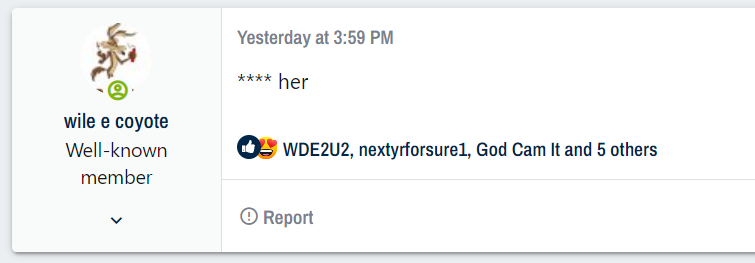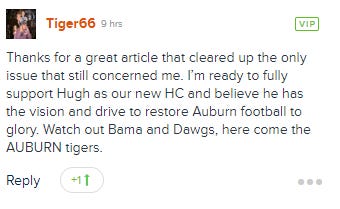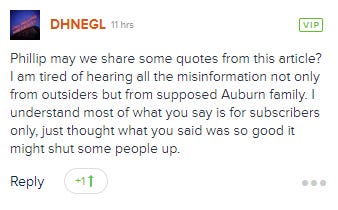Hugh Freeze hire shows how CFB media is fundamentally broken
The reasons the college football media is unequipped to hold powerful men to account run so much deeper than the decisions made by any one reporter.
One can imagine a world in which Auburn, under an avalanche of criticism for even considering Hugh Freeze, moved on to another candidate. Or responded to the emails from women concerned about this hire by revoking Freeze’s employment offer. Say what you will about corporate America, but this is exactly how things would have played out in almost any other industry besides college football; even in college football’s closest analog, the NFL, coaches get fired for less.
But that didn’t happen, and part of the story of why it didn’t happen is because the college football media abdicated its responsibility to tell the truth.
Some reasons why the college football media screwed this up so badly:
Reporters and the outlets they work for covet access, apparently above all else
Consider just about any news story broken by Bruce Feldman or Pat Forde or whoever you get your big college football scoops from. At the risk of stating the obvious, where do you think they get their information? By developing relationships with college football power brokers, including athletic directors, coaches, agents, etc.1
Writing stories that reflect poorly on sources can threaten continued access to those sources, so any public criticism must be weighed against the cost of having to look for scoops elsewhere — potentially for the duration of that coach’s tenure at the school. This dynamic cuts in the other direction, too. Writing positive stories can establish trust and strengthen a bond between a reporter and their subject; often, this is no mere unexpected side effect of a story’s publication but the express editorial purpose for commissioning the story in the first place.
That’s how you end up with respected industry elders participating venal reputation-laundering like this:

Clearly, Chris Low is envisioning a future wherein Auburn grants his request to embed with Hugh Freeze during spring practice or something, giving readers an inside account of the head coach’s long path to redemption or whatever.
As debasing as that Low tweet is, one might have expected ESPN’s hard news story on Freeze’s hire to nevertheless deal more honestly with the accusations levied against Freeze. ESPN is not, after all, a monolith. And reporters often post horrendous tweets that don’t necessarily reflect the editorial values of the organization more broadly.
What I was somewhat surprised to find out is that Low’s tweet does indeed reflect the editorial values of the organization more broadly!
ESPN’s story breaking the news of Freeze’s hire was authored by Low himself and adopts the same “everyone has a past” framing of the bad tweet. The story mentions the scandal that got Freeze fired at Ole Miss but completely excludes:
the three women who have accused Freeze of sexual misconduct while he was a teacher and coach at Briarcliff High School
the sexual assault survivor who Freeze cyberbullied in July
I contacted ESPN to find out if there is, in their editorial judgment, a deficiency in the reporting around these other two allegations that made them unfit for inclusion in Low’s story. As of this writing, ESPN has not responded to my request for comment.
ESPN is not alone in doing a terrible job on this story. Neither CBS Sports, The Athletic, nor the rotting corpse of Sports Illustrated have any remotely serious account of Freeze’s alleged misdeeds. But the abdication by national outlets of their basic journalistic responsibility would not be so damaging if their flimsy coverage merely existed alongside more robust local news coverage of the story.
But, with rare exceptions, there has not been robust local news coverage of the story.
The collapse of local newspapers and the dominance of recruiting sites
In January 2020, one of the biggest stories in college football was an ongoing lawsuit in which a former Michigan State assistant coach was suing Mark Dantonio for wrongful termination. The lawsuit was dredging up details of the program’s mishandling of a sexual assault allegation against a former player. During an editorial meeting at 247Sports, I voiced a concern that our Michigan State site had zero coverage of the lawsuit. I did not raise this concern in my capacity as a social justice do-gooder. I raised this concern in my capacity as host of a podcast called The College Football Daily. The lack of anyone at 247 covering this story made it hard for me to do my job as host: spotlighting our boots-on-the-ground reporting of the biggest college football stories.
I didn’t know at the time that I would be quitting my job four months later but, in hindsight, the response I received was the clearest articulation I would ever receive that my values and the values of my employer were irredeemably at odds.
“I think we should leave stories like that to be covered by The Athletic.”
This sentence was so shocking to me that it has been permanently emblazoned into my memory. It was an appalling sentiment to express in the moment, but time has been even more harsh.
Since then, The Athletic has scaled back its local, team-based coverage of college sports, focusing instead on national and regional reporting. Many reporters working college beats have been laid off, reassigned, or not replaced after taking jobs elsewhere. The Athletic’s acquisition by The New York Times presages further diminishment in local expertise in favor of a more national lens.
Notably, The Athletic does not currently employ an Auburn beat reporter.
If an individual publication is worried about preserving access and keeping the message boards happy, then you can see how a policy of “leave it to The Athletic” would serve their short-term interests. But what if not just one publication, but most publications — or every publication — leaves it to The Athletic? And what if The Athletic is no longer there to leave it to?
Say what you will about recruiting sites (and I will say what I will about recruiting sites), but they at least had the good sense to never remove paid subscriptions from their revenue model. That’s a big part of the reason why they are the only organizations with the resources to commit several people to covering one school’s sports team.
Editorial decisions are made from the message board up
I have been in Slack channels when Ohio State writers were yelling at national news desk writers for covering the Zach Smith story. A Georgia reporter once demanded, in front of all of my co-workers, that I be fired for accurately reporting that Kirby Smart misrepresented the SEC’s transfer policy. A far more distinguished journalist than me did get fired for writing a well-reported story about discord within an SEC school’s athletics department.
Each of these things primarily happened for one reason: the message boards revolted.
Unless the message boards have already turned on the coach because the team is bad, they simply will not countenance negative news about the program. Writers then become fearful of message board backlash and canceled premium subscriptions. Not only do they avoid negative coverage, but when necessary they will create disinformation to diminish negative coverage from other outlets.
How else to explain this lede (in a paywalled front-page article) from 247Sports Auburn writer Phillip Marshall, featuring an easily disproven lie about Hugh Freeze?
The weirdest thing about this lie is that Hugh Freeze himself has publicly acknowledged that the screenshots of him haranguing this woman are real. The most disturbing thing about this lie is that it worked:
Another comment on the article demonstrates that not only are writers like Marshall enslaved to the message boards’ us-against-the-world bunker mentality, they’re feeding it and helping it spread outside of the confines of the message board:
There are no women covering the Auburn beat
Maybe the biggest reason the reason the Hugh Freeze coverage is so divorced from the gravity of the decades of allegations that trail in wake? There are literally zero women working the Auburn beat full-time. In several hours scouring various Auburn sports sites, I only found two football bylines belonging to women; both of them are student-interns.2
While I think this is something that should change, any individual woman trying to buck the trend faces a serious uphill battle. The abuse that women in the industry get from fans is well-known, but maybe not-quite-as-well-known is that there are many corners of the college football media world where the internal workplace culture is pre-MeToo levels of toxic. Freeze’s hiring and the media’s subsequent capitulation will only serve to make matters worse.
Here’s what a woman accepting a job covering Auburn would have to know she’s walking into:
you will be covering a man who has cyberbullied a sexual assault victim
you will be covering a man who has been accused of sexually inappropriate behavior with high school students
your livelihood will depend on a media company who prioritizes access to scoops over women’s safety
you will be expected to participate in a message board on which misogynist disinformation is fomented by your coworkers
It’s not right to ask women to accept the burden of singlehandedly taking on all that bullshit. If we’re ever going to see any change, we need decisive top-down action from executives to hire women and offer their unwavering support in the face of abuse. But based on the way the Hugh Freeze story was covered, the cavalry’s still a long way off — if it ever comes.
Some good Hugh Freeze words to read
“Rub Some Church On It” by Jason Kirk
“DO NOT HIRE HUGH FREEZE” by College And Magnolia
Some good Hugh Freeze words to listen to
Some more words from me on the sorry state of college football media
Resisting the college football media-industrial complex
Here, Feldman and Forde are just examples of people who break a lot of college football news. This is not necessarily a comment on their coverage of Freeze.
AL.com had a woman working the Auburn beat last year, but she has since moved on.








This reminds me of theatre. There's a guy in Columbia that never gives a bad review. Years ago there was a hardass that people hated, but I always appreciated his honesty. The current guy doesn't want to lose access, or upset local talent.